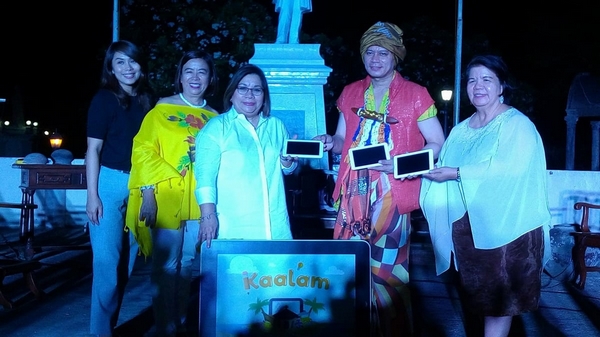
Atty. Maria Jane Paredes, AVP/Center Head of Smart Public Affairs Vis-Min (Center) led the turnover of 10 tablets to Argao town to Mayor Stanley Caminero (2nd from right). Also in the photo are Stephanie V. Orlino, Smart public affairs senior manager and head of education programs; Dr. Juanita Pinote, CTU Argao campus director; and Dr. Juliet Jeruta, DepEd-7 regional director. /CDN photo/Doris C. Bongcac
Learning the mother tongue is made fun and easy for Cebuano pupils
Reading and writing in Cebuano is now made easier with the availability of the “Kaalam” app from Smart Communications.
The app that is available for download on Google Play allows graders with Mother Tongue-Based Multilingual Education (MTB-MLE) subjects to learn to write and properly pronounce numbers and the alphabet using the Cebuano dialect.
It also has four Cebunao folklores – “Ang Bolang Diamante”, “Ang Diwata ng Konta”, “Ang Kwentas ni Ingko Kandido” and “Ang Mantalaga” – that where all retold by residents of Argao town, located around 70 kilometers south of Cebu City, for the pupils.
“This is a contextualization of the curriculum by teaching local facts, information which is part of the preservation of our local heritage that is valued by our ancestors,” said Dr. Juliet Jeruta, director of the Department of Education in Central Visayas (DepEd-7).
Jeruta graced the formal launch of the “Kaalam” app at the Unity Plaza in Argao town late on Saturday afternoon. Also present were town officials led by Mayor Stanley Caminerao, AVP/Center Head for Smart Public Affairs in the Visayas and Mindanao Atty. Maria Jane Paredes and pre-school pupils and graders coming from the town’s different public schools among others.
“This (the app) will make lessons fun, interesting and useful in assimilating for retention purposes. Sigurado ako that all the schools will start using this inside their classrooms,” Jeruta said.
Jeruta said that the use of interactive teaching materials in comparison with printed materials will surely raise the engagement of pupils.
She, however said, that teaching the Cebuano language should not be dependent only on the “Kaalam” app.
Educators should also learn to make a follow through and use their own innovativeness in making their lessons interesting and fun to keep the momentum that the app is expected to bring.
Carlyn Ceniza of the UC-Banilad College of Computer Studies that students from her school look forward to adding more contents like the Cebuano translation of colors and body parts into the “Kaalam” app in the future.
For now, the app has three main contents: numbers, alphabets and short stories.
In teaching numbers, the app provides the Cebuano and English translation of numbers 1 to 10 both written in figures and in words. It also has a guide that will teach graders its proper pronounciation and pictures to aid in counting.
Short stories are told by a narrator. These also come with illustrations of what the story is about.
While teaching the alphabet in Cebunao, Ceniza said, they also added a feature that will allow pupils to trace the alphabet to also help them develop their writing skills.
Smart’s CSR
Paredes said Smart Corporation considers education as one of the most important pillars of their Corporate Social Responsibility (CSR).
They visited Argao town last year for a storytelling session with public school children. It was then when they realized that the first class municipality in south Cebu “has a lot of stories to tell.”
The story of Maria Cacao, a goddess from the mountains of Barangay Lantoy, is only one of the many stories that town residents have been trying to retell from one generation to another.
Smart, she said, then looked for partners for their app development project.
Argao town and the Cebu Techological University – Argao campus provided the app’s contents from folklores which the local government has been trying to preserve for their children while the University of Cebu-Banilad students digitized its content.
Paredes said she is happy that “all the stars aligned” in the development of their “Kaalam” project.
She said that while DepEd willingly embraced the idea of having a Cebuano app, their other partners also extended all the help that they could give in its development.
During the “Kaalam” launch, Paredes also turned over 10 tablets which Smart donated to Argao town for use in public school learning.
“Manghinaot ta nga ang kaalam sa atong katiguwangan atong ipasa sa kabatan-onan pinaagi sa teknolohiya,” Paredes said in her message.
Caminero said he is happy that “Kaalam” app has been made available to make sure that their children learn the folklore that they have been trying to pass on to the young ones.
“This is wisdom in action and this can only come literally from Smart Communications,” he added.